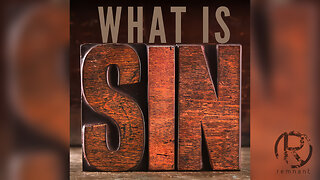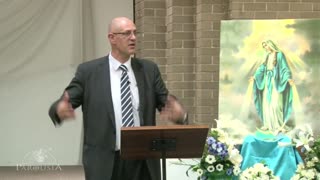Episode 1497: Sin Is 100% Real & Deadly
Definition of Sin:
Sin is an Offense Against God: In traditional Catholic teaching, sin is understood primarily as an offense against God's will and a violation of His commandments.
Contrary to the Moral Law: Sin is an action, word, or desire that is contrary to the moral law as revealed by God.
Distortion of the Good: It involves a distortion or corruption of what is good and right, often leading to a rupture in one's relationship with God.
Types of Sin:
Mortal Sin: This is a grave offense against God's law, committed with full knowledge and deliberate consent. Mortal sin, if not repented and forgiven, leads to spiritual death and separation from God.
Venial Sin: These are less serious offenses that do not meet the criteria for mortal sin. They weaken the soul's relationship with God but do not sever it.
Original Sin: This is the state of sin inherited by all human beings from the first disobedience of Adam and Eve. It is cleansed through baptism.
Sources of Sin:
Concupiscence: This is the inclination to sin that remains in human beings, even after baptism. It is a consequence of original sin.
Free Will: Human beings possess free will, which allows them to choose between good and evil. This freedom makes them morally responsible for their actions.
Sacrament of Reconciliation:
Traditional Catholics believe in the sacrament of reconciliation (also known as confession or penance) as a means of receiving forgiveness for sins, especially mortal sins.
This sacrament involves contrition (sincere sorrow for one's sins), confession (admitting one's sins to a priest), satisfaction (performing acts of penance), and absolution (the priest's prayer of forgiveness).
Role of Grace:
Catholics believe that grace, which is the free gift of God's love and assistance, is necessary for overcoming sin and living a life of holiness.
Through the sacraments and prayer, Catholics seek to grow in grace and deepen their relationship with God.
Avoiding Near Occasions of Sin:
Traditional Catholic teaching emphasizes the importance of avoiding situations or circumstances that may lead to sin.
Final Judgment:
Catholics believe in a final judgment where individuals will be held accountable for their actions. Those who die in a state of mortal sin, unrepentant, risk eternal separation from God.
-
 23:53
23:53
CatholicReboot
5 months agoEpisode 1718: Sadness during advent - 8th Deadly Sin
123 -
 27:42
27:42
CatholicReboot
6 months agoEpisode 1671: How to Live a Honest Holy Life
86 -
 3:17
3:17
The Daily Devo by Vince Miller
4 months agoKilling Sin: The Dual Confession | Nehemiah 9:6-31
21 -
 27:27
27:27
Todd Coconato Show
4 months agoWhat Is The Sin That Leads To Death? • The Todd Coconato Radio Show
1.31K -
 20:24
20:24
Healing America: Starting With You Podcast
8 months agoHow to Fight Sin: Episode Three
201 -
 26:56
26:56
Todd Coconato Show
1 year agoTodd Coconato Radio Show I What Is Sin?
654 -
 33:20
33:20
David Diga Hernandez
2 years agoHow to FINALLY Overcome Sin & Temptation (6 Keys)
90 -
 1:03:02
1:03:02
PreciousTestimonies
1 year ago"THE LAST THING I TALKED ABOUT IN NEW AGE IS EVIL & SIN" -- Why Would THAT Be You Suppose?
26 -
 52:39
52:39
ModernApocrypha
6 months agoEpisode 8 - What Sin Isn't
27 -
 1:27:57
1:27:57
Parousia
6 months agoPurgatory & Praying for the Dead - Robert M. Haddad
86